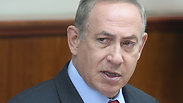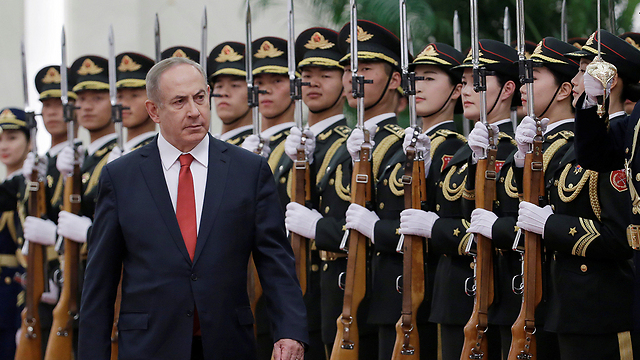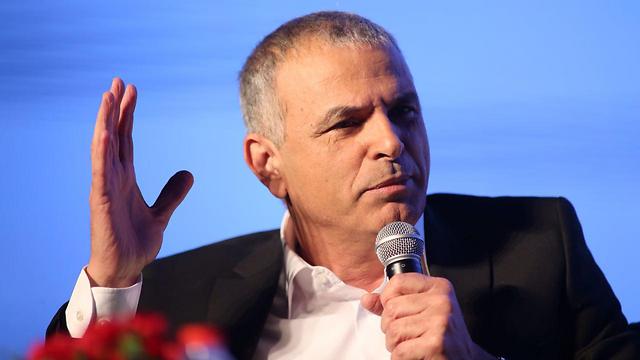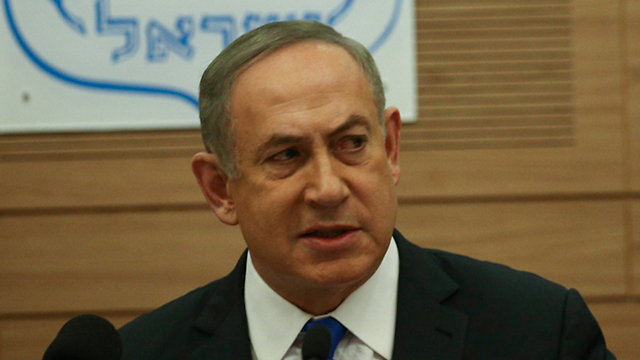
Netanyahu sets new demands to resolve spat with Kahlon over IPBC
The appearance that Kahlon 'has the upper hand' and the appointment of journalist Geula Even—wife of political rival Gideon Sa'ar—as the anchor for the channel's main news broadcast are both believed to have led the prime minister to harden his stance.
Even though a compromise that would have save the government from disintegrating was on the table, Prime Minister Benjamin Netanyahu decided Monday to backtrack on the understandings reached and set new demands to resolving his spat with Finance Minister Moshe Kahlon over the new Israel Public Broadcasting Corporation (IPBC).
"We need to take a firmer stance with Kahlon," Netanyahu, who is in China on a state visit, instructed his people.
A source close to Netanyahu said that "contrary to what was claimed in the media, the prime minister has not agreed to any plan concerning the IPBC."
Culture Minister Miri Regev—a close associate of Netanyahu's who in the past raised the question "why set up the IPBC if we don't control it?"—also said Monday that "the IPBC compromise is unacceptable to me."
According to officials in the ruling Likud party, Netanyahu decided to take a firmer stance for several reasons. Primarily, because of the optics: Kahlon appears to "have the upper hand" in his dispute with the prime minister.
In addition, the IPBC's announcement that journalist Geula Even will anchor the channel's main news broadcast came at a problematic timing: shortly after Netanyahu demanded the dismissal of the IPBC's heads—CEO Eldad Koblenz and chairman Gil Omer.
"Geula Even's appointment at the IPBC maddened Bibi and Sara," said a senior Likud official, referring to the prime minister by his nickname and Mrs. Netanyahu by her first name.

Even is married to Gideon Sa'ar, a former Likud minister and a political rival of the prime minister. "Appointing the wife of Gideon Sa'ar, who is considered a 'red cloak' for them, to a senior role in the corporation that Netanyahu loathes—that was too much," the senior Likud official said.
According to a close associate of the prime minister, "This is a move done by the IPBC to spite Netanyahu in light of his efforts to shut it down."
There have been widening fissures between Netanyahu and Kahlon over the fate of the Israel Broadcasting Authority (IBA) and the new Israel Public Broadcasting Corporation (IPBC).
Netanyahu has withdrawn his support for the IPBC, which is due to start broadcasting at the end of April, deciding instead to fight to keep the existing IBA on air by combining the two public broadcasting bodies.
In a meeting on Saturday with Likud ministers, Netanyahu declared that he will stand against establishing the IPBC, adding, "If we don't reach an agreement with Kahlon, we will hold elections."
The prime minister asserted that restructuring the IPBC would not require further spending and that "the cost of keeping the IBA running is tens of millions of shekels cheaper than erecting the IPBC"—assertions Kahlon and the Finance Ministry have rejected.
Netanyahu has also tried to get Kahlon to support legislation he is trying to push through that would give the Israeli government control over public broadcasting, something the finance minister opposes.
Representatives of Netanyahu and Kahlon are expected to meet again on Tuesday in an effort to break the impasse in talks.
Kahlon's main demand is for the IPBC to start airing at the end of April as planned, while Netanyahu set a list of demands, including the removal of Koblenz and Omer, passing legislation to supervise the media in a first reading at the Knesset even before the IPBC starts airing, and the IPBC hiring more employees from the IBA.
Another demand by Netanyahu is that the Israel Public Broadcasting Corporation's name be changed and must not include the word "corporation."
"Netanyahu won't hear the word 'corporation,'" a Knesset source said. "He decided that the corporation won't be established, but if a new media body is established by the end of April—its name must not have the word 'corporation.'"
The Knesset source said the prime minister seeks to change both the essense and the content of the IPBC and wants to start with changing its name.
Opposition to early elections on both sides of the aisle
There is a growing opposition inside the Netanyahu's own Likud party to what ministers and MKs consider to be irrational stubbornness by the prime minister on the topic of the IPBC.
Senior party officials said it was possible Netanyahu wanted to go to early elections for different persons, perhaps having to do with the investigations against him, and that he has created this crisis as an excuse.
"If Netanyahu thinks he has a majority to take all of us on an adventure because of his tantrum over the IPBC, he's mistaken," said one senior Likud official. "Quite a few MKs in the Likud know that they won't be elected into the Knesset again, and they won't let Netanyahu throw them under the bus because of his own personal matters."
Another Knesset official described Netanyahu's conduct on the IPBC issue as "borderline obsession" and said that "No one really understands what's going on with him. He might end up bringing down the government and going to early elections because of Geula Even."
Sources close to Netanyahu decline to comment on these claims.
Opposition parties also joined the chorus of criticism against the prime minister. "This isn't a compromise, but a dodgy plan that would allow Bibi to get what he wants: Castrated media and political beheadings," an official in Zionist Union said of Netanyahu's talks with Kahlon.
Zionist Union leader Isaac Herzog has asked the attorney general and state comptroller to bar Netanyahu from dealing with matters concerning the IPBC, citing a conflict of interests. "His conduct over the IPBC and IBA renders his resignation from the role of communication minister over his conflict of interests meaningless," Herzog said.
A legal issue might, however, pile more difficulties onto the efforts to reach a compromise between Netanyahu and Kahlon: Neither the prime minister not the finance minister has the authority to dismiss the heads of the IPBC as part of their compromise deal.
Under the Israeli Public Broadcasting law, put in place to create a separation between the political ranks and the broadcaster's employees, Netanyahu and Kahlon will have to provide legal reasons for Koblenz and Omer's removal. The broadcaster's employees can only be dismissed over serious professional or disciplinary failings, and Netanyahu and Kahlon's deal meets neither criteria.
Yuval Karni, Tova Tzimuki, Itamar Eichner and Raz Shechnik contributed to this report.
(Translated and edited by Yaara Shalom)













